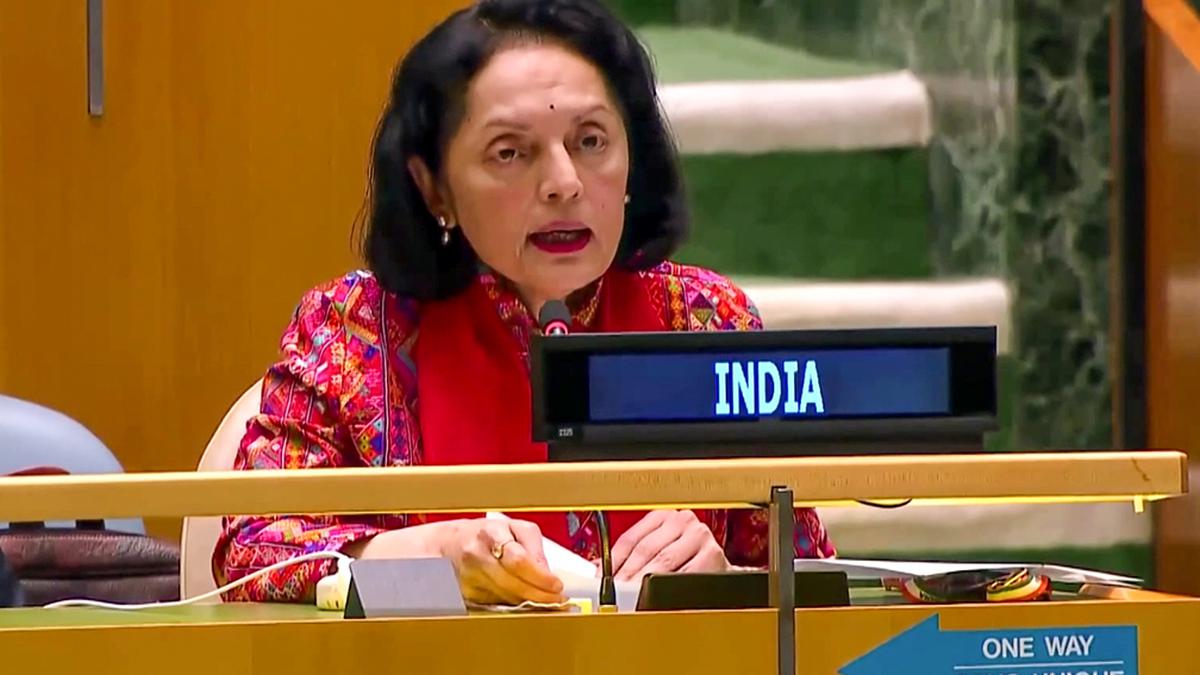
India hits out at Pakistan for references to Ayodhya, CAA in UNGA
The Hindu
India has slammed Pakistan and described it as a “broken record” that remains stagnant while the world progresses, after Islamabad’s envoy made references to the Ram Temple in Ayodhya and Citizenship Amendment Act during remarks to the United Nations General Assembly (UNGA.)
India has slammed Pakistan and described it as a “broken record” that remains stagnant while the world progresses, after Islamabad’s envoy made references to the Ram Temple in Ayodhya and Citizenship Amendment Act (CAA) during remarks to the United Nations General Assembly (UNGA.)
India’s Permanent Representative to the UN Ambassador Ruchira Kamboj said this while responding to comments made by Pakistan’s Ambassador Munir Akram during the plenary meeting on March 15 where the resolution ‘Measures to combat Islamophobia’, introduced by Pakistan, was adopted by the 193-member UN General Assembly.
"One final point concerns a delegation (and its remarks) that, much like a broken record, remains sadly stagnant while the world progresses,” she said.
Mr. Akram made references to the consecration of the Ram Temple in Ayodhya as well as to the implementation of the Citizenship Amendment Act.
Ms. Kamboj said it is “unfortunate indeed to witness this delegation’s limited and misguided perspective on matters relating to my country, the more so, when the General Assembly considers a matter that demands wisdom, depth, and a global outlook from the entire membership – perhaps not the forte of this delegation.” Ms. Kamboj delivered a statement in explanation of India's position during the adoption of the resolution on 'Measures to combat Islamophobia' at the UNGA.
The General Assembly adopted the resolution, with 115 nations voting in favour, none against and 44 abstentions, including India, Brazil, France, Germany, Italy, Ukraine and the UK.

Several principals of government and private schools in Delhi on Tuesday said the Directorate of Education (DoE) circular from a day earlier, directing schools to conduct classes in ‘hybrid’ mode, had caused confusion regarding day-to-day operations as they did not know how many students would return to school from Wednesday and how would teachers instruct in two modes — online and in person — at once. The DoE circular on Monday had also stated that the option to “exercise online mode of education, wherever available, shall vest with the students and their guardians”. Several schoolteachers also expressed confusion regarding the DoE order. A government schoolteacher said he was unsure of how to cope with the resumption of physical classes, given that the order directing government offices to ensure that 50% of the employees work from home is still in place. On Monday, the Commission for Air Quality Management in the National Capital Region and Adjoining Areas (CAQM) had, on the orders of the Supreme Court, directed schools in Delhi-NCR to shift classes to the hybrid mode, following which the DoE had issued the circular. The court had urged the Centre’s pollution watchdog to consider restarting physical classes due to many students missing out on the mid-day meals and lacking the necessary means to attend classes online. The CAQM had, on November 20, asked schools in Delhi-NCR to shift to the online mode of teaching.










